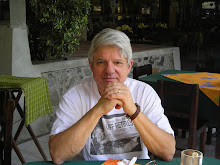Photojournalist Neil Jackson has recently conducted an interview with Dr. Colin J. Campbell, retired -- Texaco, British Petroleum, Amoco and founder and Honorary Chairman of the Association for the Study of Peak Oil and Gas (ASPO). The interview is reproduced here in full.
Blog comments follow the interview.
Neil Jackson: Why is peak oil important?
Colin Campbell: Peak Oil is a turning point for mankind. It is a big subject.
In short, the population only doubled over the first 17 centuries of the last millennium. But then came coal followed by oil and gas, and the population increased six-fold. These new energy sources, especially oil, the easiest, allowed the rapid expansion of industry, transport, trade and agriculture allowing the economy to expand greatly. It was accompanied by the growth of financial capital as banks lent more than they had on deposit, confident that Tomorrow's Expansion was collateral for Today's Debt.
But now we face the dawn of the Second Half of the Age of Oil when supply declines from natural depletion, meaning that debt goes bad (as is already happening) and the economy contracts. Today's oil supply support 6.7 billion people, but by 2050 the supply will be enough to support no more than about 2.5 billion in their present way of life. So the challenges of using less and finding other energy sources is great.
The transition threatens to be a time of great tension : there are already tribal wars in Africa, disturbances in many places including rioting in Greece. Urban conditions will become especially difficult.

Looming lifestyle changes, derelict housing. Ibrox, Glasgow, UK NJ: What has been your personal reaction to peak oil?
CC: I happened to have worked in the oil industry and I was not alone in being fully aware of depletion for a long time. But geologists are passive people, given to describing rather than changing things. We can describe the Cretaceous but not change it.
NJ: How are you or your family preparing?
CC: I am too old to do much, but live modestly in an Irish village. My wife however is actively trying to introduce allotments here by which people can feed themselves. We do have a solar panel on the roof, providing hot water from about May to October. If the sun doesn't shine I don't wash.
NJ: Do you think the media are playing the issue down? Has there been much coverage of the issue in the mainstream media? Any ideas as to why?
CC: The media is now taking a serious interest : a trail of journalists and TV crews have been here over the past few years. The BBC and no less than Korean TV was here recently. There are of course vested interests (BP for example) keen to suppress Peak Oil but I think the word is out.
NJ: How about governments? Are they playing the issue down, and if so, what examples can you give? Do you think any governments are approaching Peak Oil correctly? Who?
CC: The position of governments is changing. They are heavily influenced by classical economics and badly advised by such practitioners for whom finding oil is just a matter of investment.
The International Energy Agency is the OECD watchdog, although in practice more of a consumers lobby (not wanting OPEC to know its strength). Ten years ago internally it recognised that peak oil would arrive around 2010, but issued no more than a coded message. Now as Peak Oil arrives it changes its tune, for fear of losing credibility, and begins to admit to it under the slogan let's leave oil before it leaves us.
I happen to know the Irish Minister, who understands the position perfectly and is trying to prepare, but he tells me that the political obstacles are very great. It is promising that Obama has renewables high on his agenda and seems to recognise that the attempted conquest of Iraq's oil failed. Oil discovery in Britain peaked in the 1970s and should have alerted the government that the inevitable corresponding peak of production would follow, but Mrs Thatcher believed in the free market, and exploited the resources as fast as possible, which accelerated depletion.
Britain exported its surplus at low prices but now faces rising imports at high prices. Russia now seems to be aware of its power by controlling Europe's gas supply, and will likely try to conserve what is left for its own use rather than export, which makes sense. It is a big subject, and does not exactly give one much confidence in government.
NJ: It is sometimes said that there are billions of barrels of oil reserves locked up in Canada’s tar sands. Can you say anything about these reserves with respect to peak oil? What are the challenges faced when bringing this oil to market?
CC: The resource in the ground of tarsand in Canada and elsewhere is huge, but extraction is slow and costly, yielding a low or even negative net energy return. My guess is that oil prices in the future will range in the $50-100 range as higher prices would dampen demand by economic recession. If so this is a constraint on developing tarsands (some projects are said to be viable only at $90+) ... and indeed restrain the development of renewable energy).

Poverty and the end of suburbia. Benchill, Manchester, UK NJ: The discovery of oil peaked some 40 years ago – how much oil are we discovering now and what potential is there for further discoveries--new, significant discoveries? Does the Arctic represent another Saudi Arabia? How about the Antarctic?
CC: It is difficult to get good information on recent discovery, but my best estimate is that it is running in the 5-10 billion barrel a year range. The accessible world has now been thoroughly explored, such that all the major productive provinces and large fields within them have been found.
Attention now turns to the deepwater and Polar regions. I think that the main deepwater areas have also already been found : they depend on very exceptional geological conditions as most of the oceans are definitely non-prospective. I do not entertain great hopes for the Polar regions because I think they are generally deficient in effective source rock, and that seal integrity has been impaired by vertical movements of the crust due to the weight of fluctuating ice caps.
There are a few freak occurrences, such as Prudhoe Bay in Alaska, but generally Polar seems to be a gas-prone domain, with sniffs of encouragement that eventually disappoint. It is unlikely to have any material impact on Peak Oil.
NJ: How familiar do you think the senior staff of Western oil majors are with the concept of peak oil? Do they see it as a serious problem either for their business or the wider global economy?
CC: In earlier years, major oil companies did tend to be run by people with exploration experience, for whom peak oil has long been evident (Harry Warman once Exploration Manager of BP was one of the first to publish on it), but now most are run by financiers and engineers, who lack the deeper resource insights. But generally I think they understand.
The Seven major companies are now reduced to four by merger, which is a sign of contraction, and they are selling off subsidiary refineries and marketing chains, evidently recognising that falling supply will give downstream over-capacity.
But remember that the job of managers is to sing to the Stock Market to protect their shareholders' interests under the present system whereby the merits of a firm dividend have surrendered to speculative movements on the Market, which is largely a public relations exercise, as these brokers can have little real understanding of the businesses in which that take positions ("investment" is hardly the word). It is simply not the job of oil company managers to concern themselves with global issues. But that said they do begin to hint and half admit to the obvious truth : Total and Chevron are probably the most forthright, with BP being the least.
NJ: How does oil form, when did it form, where does it form - what does this tell us about the likelihood of finding significant new oil in the middle of the Atlantic... or in the Arctic?
CC: The bulk of the world's oil was formed under special conditions of global warming 90 and 150 million years ago.
Algae proliferated in warm sunlit tropical waters, and the hot surface water prevented normal circulation such that stagnant anoxic conditions occurred at depth. The algal organic remains were accordingly preserved in rifts. On burial to about 2000 meters, it was cooked enough to be converted into oil, which then began to move upwards. Much escaped or was dissipated, but some was trapped at the top of geological structures (arch-like anticlines or against faults).
In addition to these two main epochs there were other local occurrences of little global significance. Naturally, the older the source-rock the greater the chance of loss over geological time.

The crash of supermarket culture. Ibrox, Glasgow, UK NJ: What is your opinion on reserve growth?"
CC: Assessing the size of an oilfield early in its life poses no particular scientific challenge, although it is naturally subject to a degree of uncertainty. Reporting its size is another matter.
The oil companies were subject to strict Stock Exchange rules designed to prevent fraudulent exaggeration while smiling on under-reporting as commercial prudence. Accordingly the major companies reported only as much as they needed to deliver a satisfactory financial outcome. The resulting upward revisions gave a comforting but misleading image of reserve growth.
Those days are however substantially over as the giant fields offering the main scope for upward revision mature. OPEC for its part greatly exaggerated in the 1980s when they were vying with each other for quota based on what they reported as reserves. The industry has developed various technologies (steam, nitrogen, CO2 injection and horizontal drilling plus sophisticated seismic to map the reservoirs in detail) which can increase the recovery, and hence give reserve growth. But the scope for doing so could easily have been foreseen early in the life of the field, even if it was not normal to report it.
NJ: At the ASPO meeting after the Barcelona conference you were talking about retiring from the newsletter at the end of 2008 - and after around 1000 items. The future plan was for individual national ASPO chapters to produce newsletters, or submit items for someone else to correlate. Is that still going ahead?
CC: Yes, I am a bit undecided about the future of the ASPO Newsletter. Obviously I can't keep doing it for ever, and also the main message has been delivered, so I find myself touching more and more on political subjects on which I lack any expertise.
ASPO has evolved as a loose organisation lacking any normal management or cohesion or rules, but that is a good thing as the different entities can do whatever is appropriate and possible in their own countries. I suppose in one sense the Newsletter does hold them together giving a certain common purpose.
One model might be to rotate the overall direction (including the newsletter), but in practice I doubt if that will happen. In one sense its mission has been accomplished as dealing with life in the Second Half of the Oil Age when everything is in decline calls for very different approaches.
NJ: Are we progressing towards implementing technologies to utilize alternative energy sources at a fast enough rate to prevent an economic collapse, or at least to minimize the impact the advent of Peak Oil is having/will have on the global economy?
CC: I doubt that renewable energies will ever replace oil and gas sufficiently to maintain the past order of things or still less allow economic growth to continue. They are of course greatly needed for the surviving communities.
My own preference is tidal energy to tap the massive regular lateral flows of water. Apparently they can build funnel-like walls on the sea bed forcing the tides to speed up through the constriction, and turn a rotor, generating electricity. But apparently such schemes did not compete with cheap oil and gas so far.
There is of course massive scope for using less energy : turning off all those loudspeakers and TV screens in public places would help.
NJ: What effect do the new technologies have on the projections for when production will peak?
CC: I don't think new technologies will have any impact on the date of peak, which I estimate to have been passed in 2008 ("all liquids"), but they can of course ameliorate the subsequent decline. I think most of the necessary technologies are already well known, so the issue is more about applying them than inventing a magic wand.
NJ: There is a lot of debate about why oil prices were so high during this summer, why they've dropped so quickly since then. What is the explanation for this? Were high prices due to "speculation" as many have argued or was it supply and demand, or both, or something else?
CC: I think that Regular Conventional oil peaked in 2005 and prices began to rise, although the shortfall was partly made up by costly tarsands and deepwater production. The rising price trend attracted the interest of the traders who started buying futures and so forth. It might also have made sense for the industry to keep the tanks full, watching them appreciate in value.
But eventually the rising price had an adverse impact on the real economy and the shrewd traders started to unload, selling short on the futures market. The industry too might have started draining its tanks.
But perhaps more important was the flood of petrodollars that the high prices delivered to the governments and royal families of the Middle East, where it still costs $10-15 to produce oil. They probably sent the surplus to western banks who promptly loaned it out on ever less sure collateral. The petrodollars were not really money in the sense of representing work or barter, but simply profiteering from shortage.
The whole flimsy financial edifice has now crashed, and some of the sillier governments are now pumping yet more fictional money into the system to encourage new consumption. Such policies may briefly succeed, but will only make the subsequent crash worse.
We enter a new world, as the principal energy that drove the anomalous past two centuries heads into decline from natural depletion. This is not necessarily a doomsday message. I have known many simple people in different parts of the world who smiled and laughed not being part of the consumer society.
There are encouraging signs. A BBC film crew who was here recently told me that they had become so convinced of the Peak Oil issue, which they had studied to make their programme, that they had decided to quit the BBC and buy a small farm in the west of England on which to build a simple sustainable future. That was most encouraging, I thought.

The end of the road for one petrol station. Near Derby, UK ---
Photojournalist Neil's slideshow, which looks in part at Peak Oil, can be viewed here.
Blog comments:
Dr. Campbell provides a valuable historical and global perspective on Peak Oil, geology, oil reserves, and the economy.
ASPO has been forecasting not only when Peak Oil and Gas would occur, but also how oil production will decline. ASPO could continue to conduct research on future oil production and net oil and gas production. As oil and natural gas production decline, more oil and natural gas energy is expended in extraction and refining processes, and less net oil and natural gas are actually produced. Because the net production curve toward depletion is steeper than the production curves that we see on most all charts, this is an important question. For much deep water oil and gas extraction, the point at which the amount of oil/gas expended equals the amount of oil/gas produced is reached quickly, especially when all of the oil/gas used for manufacturing all of the ships, pipelines, platforms, refineries, parts, their manufacture in factories that use energy, and all of the employee/stock owner salaries/dividends/pensions for all of the companies (salaries/dividends/pensions are spent and use oil/gas), and transportation for all of the above parts and employees.
Dr. Campbell concludes that alternative energies will not make up for much of the decline in fossil energies, and he favors developing tidal energy. My analysis indicates that alternatives and renewables will use up much fossil energy and liquid fuel in their development and yield electric energy, which is not the liquid fuel we need for tractors/combines, trucks, trains, and ships. And objective analysis indicates that tidal energy will not be developed due to siting limitations. And again, it yields electric energy, which is not needed as factories, commercial centers, and offices close.







